The transport legacy of outgoing mayor Boris Johnson
- Published
- comments
Is it really eight years ago that Boris Johnson first became London's mayor?
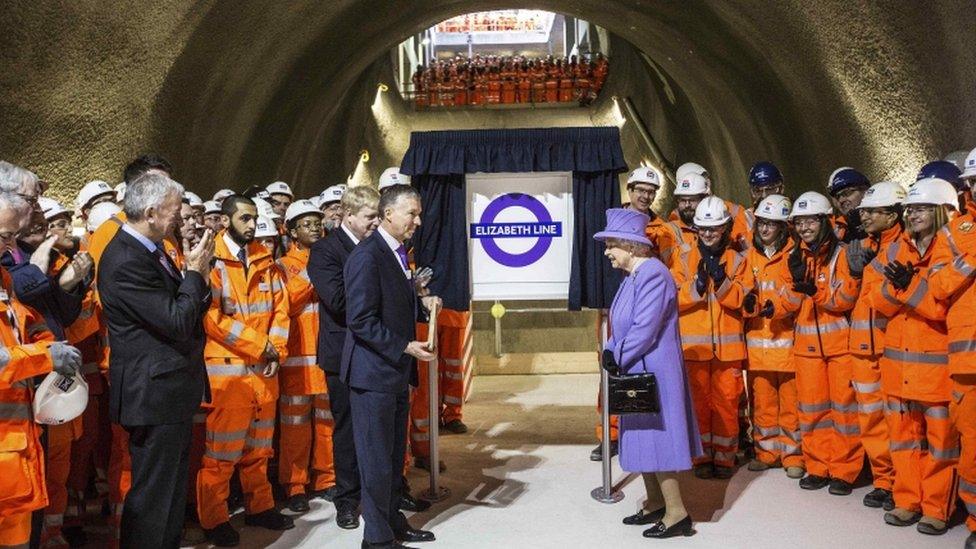
The Queen opening Crossrail, which has been named after her as Elizabeth Line
My time covering transport at BBC London has nearly mirrored his in office - and so as he departs I thought it timely to put down some non-definitive thoughts.
Recently I asked Mr Johnson if he enjoyed dealing with the transport - his answer was quick: "Of course, it's the best bit."
But it has not been without its ups and downs and controversy. And while there have been flamboyant quotes - remember the "grit-snow lasagne" - what has changed?
Big ticket items
Over the last eight years, even his most fierce critics would acknowledge there has been huge investment in transport.
Crossrail is due to open, the Tube upgrades have continued and the underground service seems better although overcrowding continues to be a problem.
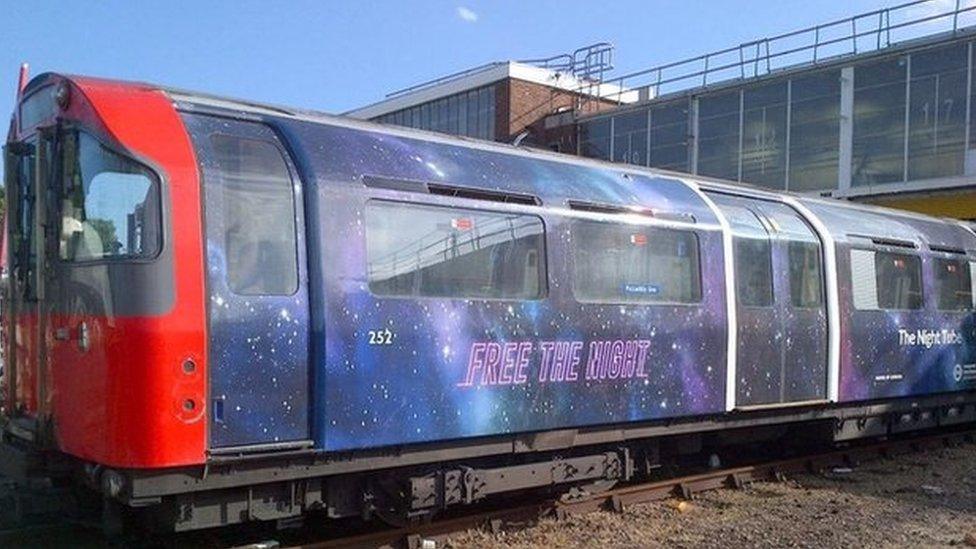
Night Tube service is due to start later this year
While the mayor seems reluctant to highlight Tube reliability as an achievement, according to Transport for London (TfL) figures, it has improved.
There have been many bumps - for example the Jubilee line upgrade - which initially hit problems as the PPP contractor Tube Lines struggled, and weekend closures were extremely unpopular.
The solution - something else not mentioned very much - was to kill off the PPP by buying the shares of Bechtel and Amey (Ferrovial) from Tube Lines for £310m, external. In effect it brought the upgrade back in house.
There have also been run-ins with the unions as huge changes were implemented on the Tube.
Mr Johnson changed tack on ticket office closures which he initially opposed.
He also tried to get through a Night Tube - as yet there isn't an official start date. And he never sat down with the transport unions, preferring TfL bosses to do the talking.
Elsewhere, the Overground has been a big success story as has the rise of contactless payments for example.
Of course, TfL has only been able to do these projects as it based its business plan on increasing fares at inflation +1%. So this all came at a price for commuters, who were paying for future investment - today - with higher fares.
While sometimes you got the feeling some projects would probably have happened anyway - the mayor's mission was selling the point that higher fares were needed for higher investment.
Although towards the end of his eight years, it felt like fares were as high as they could go. And don't forget he relied on central government cash to increase them just in line with inflation.
And there is the question if Mr Johnson was hard enough in driving through efficiencies at TfL. Could there have been more savings?
Cycling
If there is a Boris Johnson legacy, then cycling infrastructure is probably it. Segregated cycle superhighways are now opening and there is political consensus to continue building them.
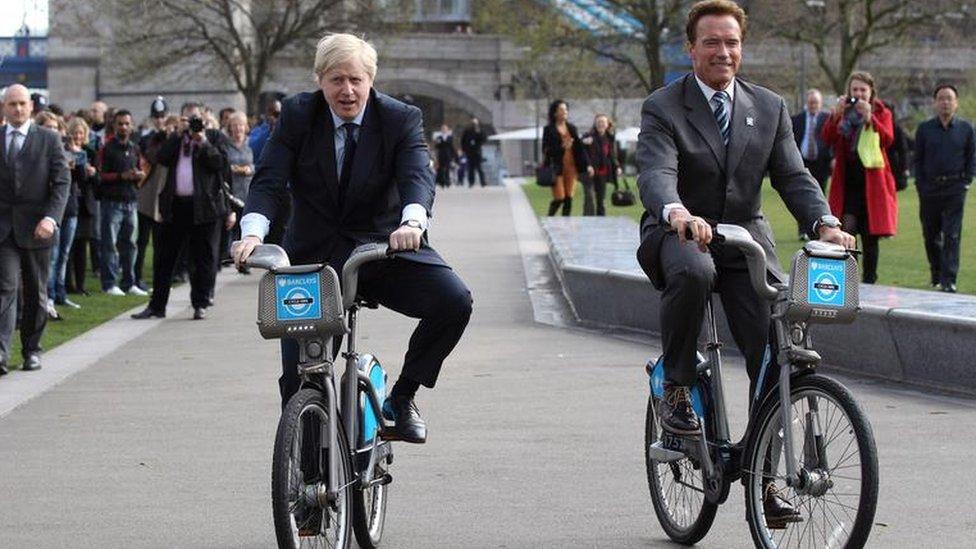
Boris Johnson's came to be identified with the cycle hire scheme and dedicated cycle superhighways
The mayoral candidates do not want to be seen to be undoing the work done.
In that sense, his legacy is as political as it is physical.
But it was not a straight-forward route. In the first term of Mr Johnson backed un-segregated "blue paint" bike lanes which no-one really liked.
Cycle Superhighway 2 encouraged cyclists onto a dangerous junction at Bow roundabout.
It encouraged cyclists but gave them no protection. The cycling lobby, The Times paper and many cycling bloggers demanded more.
The turning point came in the mayoral election of 2012, when Mr Johnson changed his policy to segregated bike tracks and promised a cycling commissioner to drive them through.
A horrendous number of deaths in 2013 also increased pressure on the mayor to act. He deployed traffic police onto the most dangerous junctions.
Today, segregated bike tracks are opening.
And the cycle hire scheme, which was meant to be at "no cost to the taxpayer", will according to the London Assembly have cost £225m by 2016, external.
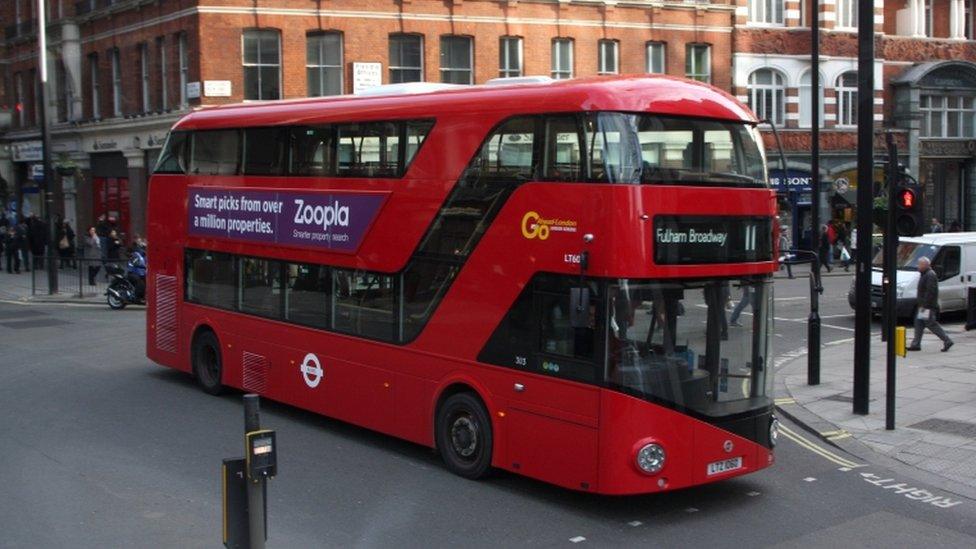
New Routemasters have divided opinions
And the construction of the cycle tracks have added to one of the big problems facing the next mayor - congestion.
Mr Johnson called it "operation juddering climax". And there's no doubt congestion has got worse - something the next mayor will need to tackle.
Again he switched policy from "smoothing traffic flow" of the first term and dismantling the Western Extension of the Congestion Charging Zone, to giving over road space to cyclists.
Eventually that created a "bikelash" even though City Hall tried to point out congestion was being created by an increase in white vans, construction and the huge increase in private hire cars due to apps like Uber.
Pollution
While air quality has gone up the political agenda, it is still a huge problem with thousands of Londoners dying each year prematurely due to bad air.
London experimented with "dust suppressants" and "green walls" but while City Hall says they are tackling pollution levels, they still breach EU limits.
Clean air campaigners say that Boris Johnson has failed to get a grip on this problem, external and his plans for an ultra-low emission zone are too far off.
"Vanity" projects
I have lost count of the number of outlandish ideas that have been mooted and then withered.
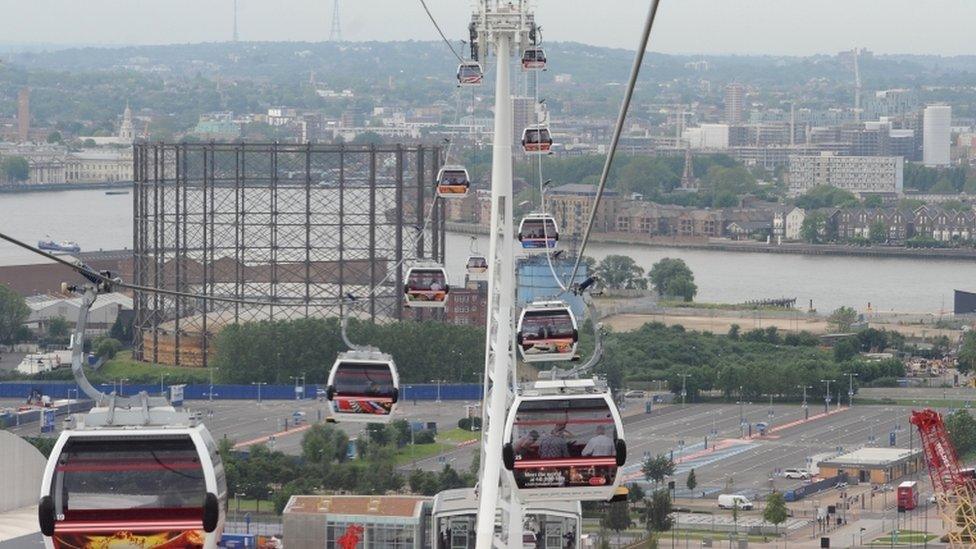
The world's most expensive urban cable car has become a tourist attraction
Odd schemes like the tunnel under Hyde Park or a bike track on the side of rail tracks.
Then you'd hear an idea like a cable car over the Thames - and they would actually deliver it.
It is the most expensive urban cable car in the world and don't forget it's built with some regeneration money from the EU and TfL cash - but at the moment it is essentially a tourist attraction.
One day it might be a regeneration tool but the number of commuters using it is tiny.
Could you lump in the New Routemasters in as an expensive vanity project?
Certainly the mayor's opponents never liked them and thought it would be better to buy hybrids off the shelf.
Overseas sales never materialised and they have had all kinds of problems with hybrid engines and non-opening windows.
But when you speak to some Londoners there is a kind of begrudging affection for them and it was the use of the Routemaster as a political tool during the 2008 election that got Mr Johnson elected.
And so they will always probably polarise opinion.
Thames Estuary Airport
If there's one project that is the mayor's pet it is the Thames Estuary Airport. If there is such a thing as small talk with a mayor - this is the area it will usually veer into.
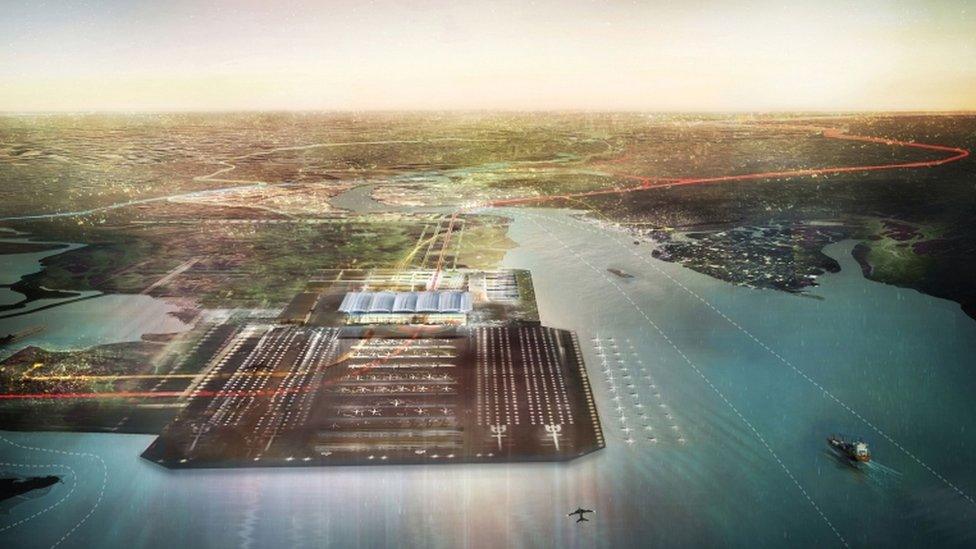
The Thames Estuary Airport project could define Boris Johnson's future career
And it was his pet project from very early on in his first term.
He took journalists out into the estuary to look at potential sites. He lobbied the Airports Commission, and then attacked it when it rejected his idea.
It has been derided as a folly - but it is probably the one transport project that is now wedded to his future career.
This has been eight years of huge investment in London transport. I have lost count of the number of new infrastructure projects and tunnels I have seen funded in part through higher fares.
There have been policy changes and switches in focus.
And a mix of the pragmatic steady hand on the tiller and the more outlandish.
But ultimately it will be commuters who'll judge Boris Johnson's eight years in charge of London's transport.
- Published10 February 2016
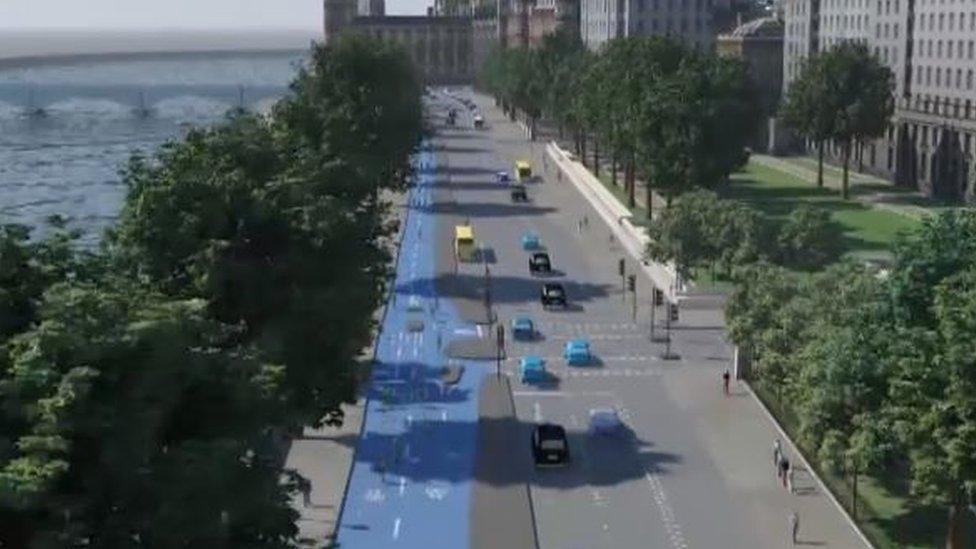
- Published3 September 2014
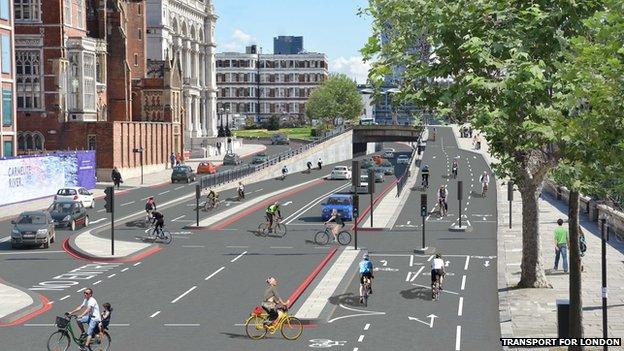
- Published15 November 2013
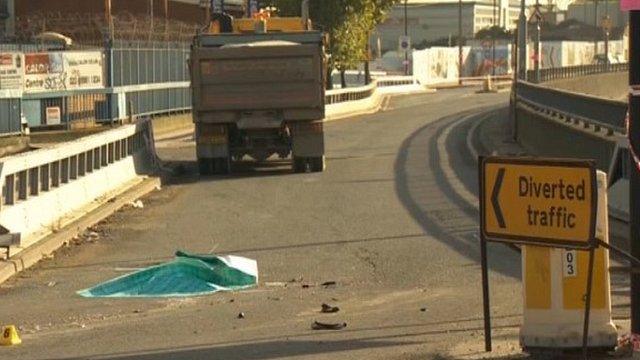
- Published27 January 2015
- Published21 November 2012
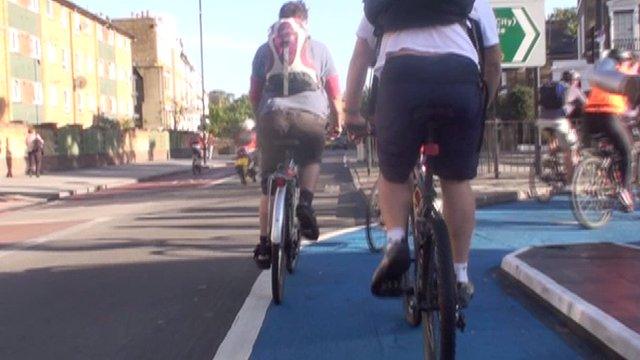
- Published6 March 2013